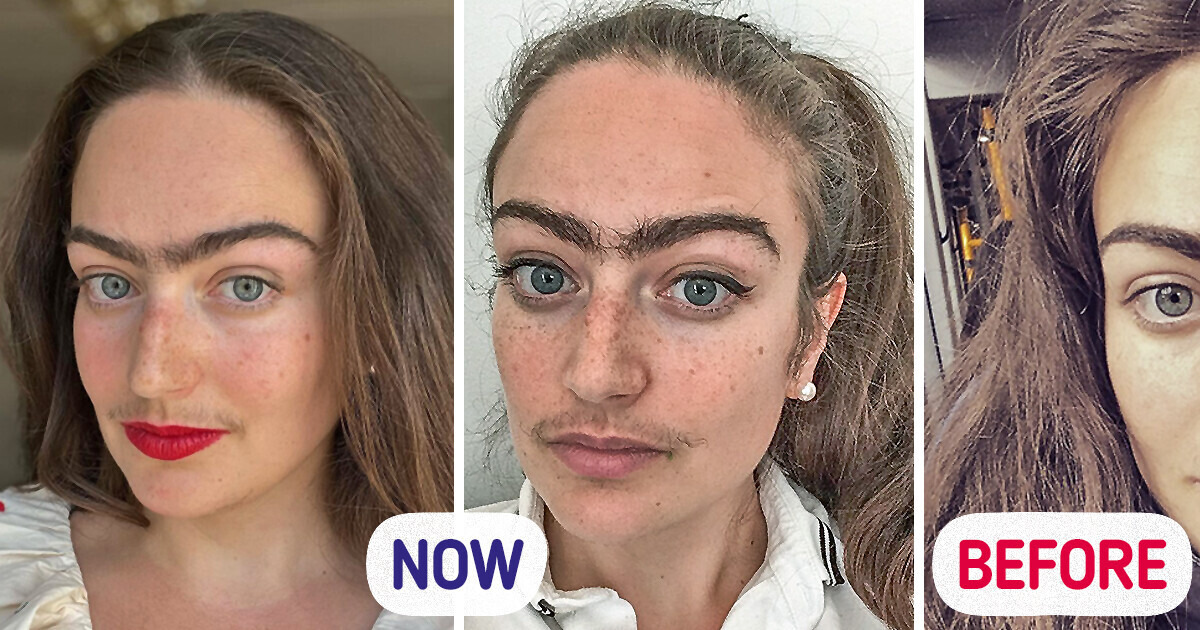Eldina Jaganjac from Copenhagen embarked on a personal journey that quietly yet boldly redefined her sense of self, questioning societal expectations around beauty and self-expression. Growing up in a culture where appearances are often scrutinized, Eldina made the unconventional choice to let her facial hair grow naturally, sharing her experience across social media. This decision wasn’t a mere whim; it was the culmination of a growing awareness of the double standards women face, especially around body hair. Eldina began to ask herself: Why was it acceptable for men to embrace natural body hair while women were pressured to constantly groom?

Eldina’s transformation wasn’t about rebelling against grooming but about challenging the unspoken rule that dictates how women should present themselves. “It’s not that I’m against the idea of grooming or choosing to shave,” Eldina shared. “But the expectation that women must do it continuously without question—it’s that expectation that bothers me.” For her, it wasn’t about abandoning personal grooming altogether; it was about questioning why these routines had become such a rigid part of women’s lives. Through her social media posts, Eldina started a quiet, powerful conversation on how beauty standards shape behaviors, often without us realizing it.

As Eldina’s story reached more people, her inbox began filling with messages from women around the world. Many shared their own struggles with the societal pressures that had shaped their lives, recounting the anxiety they felt about keeping up with conventional beauty norms, especially around hair removal. These were stories of women who felt compelled to hide any visible body hair—not because they wanted to, but out of fear of judgment or rejection. For Eldina, it was surreal to see how her decision to keep her facial hair had sparked such a wide conversation. “It’s strange,” she remarked, “that a simple choice to let my facial hair be could create such a reaction, especially when men with thick brows or beards are simply seen as having a personal style.”

At the core of Eldina’s message is a deep commitment to authenticity and self-acceptance. “If someone doesn’t value you for who you are, there are plenty of people out there who will,” she explained. This approach naturally extended into her dating life, where she viewed her appearance as a kind of self-filter, helping her to easily identify who was open-minded and who was not. “Ironically, embracing my natural look has led to more positive interactions and helps me immediately recognize who I might be incompatible with,” she noted. In this way, her choice became a form of self-empowerment, allowing her to move through her social and dating life with greater confidence and clarity.

But Eldina’s perspective on beauty and personal grooming reaches beyond individual choices; it serves as a gentle critique of society’s ever-shifting beauty standards. “Beauty standards are not just random; they change all the time,” she pointed out. “Yet we follow them as if they were fixed truths.” Her reflection on the fleeting nature of these norms encourages others to question why they adhere to them so rigidly. By highlighting the temporary and often arbitrary nature of beauty standards, Eldina reminds us that true beauty is deeply personal and not something to be dictated by changing trends.

For Eldina, her journey isn’t just about facial hair; it’s about self-reflection and embracing one’s true self. She encourages others to ask themselves why they participate in specific grooming routines—are they driven by genuine desire or by an unconscious fear of judgment? Her experience serves as a call to consider our own motivations, to understand whether our actions align with our values, and to let go of practices that don’t serve us. In doing so, Eldina has inspired others to approach self-care and personal expression from a place of authenticity.
Eldina’s story resonates so strongly because it taps into a universally felt experience—the pressure to conform to society’s expectations of beauty and behavior. At some point, nearly everyone has felt this weight, whether it’s about how we look, how we dress, or how we act in public. Eldina’s journey serves as a powerful example for those who may still be grappling with these pressures. Her choice to stand confidently in her natural appearance offers hope and reassurance that beauty is, indeed, subjective and that the only approval that truly matters is our own.
As her story continues to unfold online, Eldina has inspired discussions on authenticity, beauty standards, and the courage to challenge norms that don’t resonate with us personally. Her message is a reminder that while the journey toward self-acceptance may be challenging, it’s ultimately rewarding and liberating. Through Eldina’s experiences, we’re invited to consider our own values and the motivations behind our choices, encouraging us to live in a way that feels genuine and true to who we are.
In reflecting on Eldina’s journey, we’re reminded to examine our relationship with societal expectations. Do we adhere to certain practices out of genuine preference, or are we motivated by a fear of judgment? Eldina’s story offers a compelling insight into the freedom that comes from living authentically, showing us that in a world filled with diverse expressions of beauty, there’s always space for each of us to be unapologetically ourselves.
